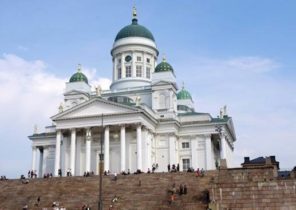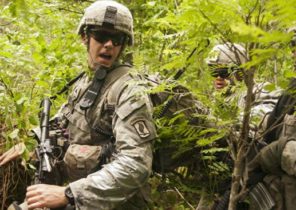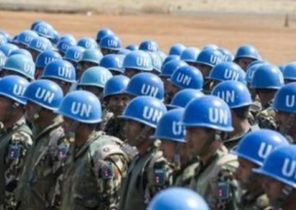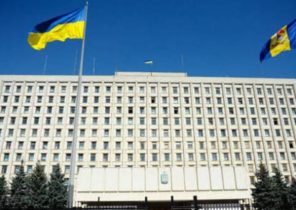A week after the joint exercises of the US and British Royal Navy in the Barents sea, officials of the US State Department once again warned that Russia and China increasingly challenge the US interests and its allies in the region.
During a special briefing on Arctic interests of the United States, concerns were raised about the fact that the consequences for the national security of countries may have Chinese investment in the region.
“You need to have mechanisms by which it will be possible to study these (Arctic) investments viewed through the prism of national security,” explained Michael Murphy (Michael J. Murphy), Deputy assistant Secretary of state for Europe and Eurasia.
At the briefing, also emphasized that China may want to take advantage of the situation with covid-19. Although specific examples of life in the Arctic circle or in Norway, US officials failed, they warned that “Norway, Sweden, Finland, and Canada, and Iceland — all of them feel the same as we, because of Chinese disinformation and the attempts of China to confuse the situation with the pandemic and to hide its sources.”
Last week, Chinese foreign Minister Wang accused the U.S. attacks on China concerning the coronavirus and slander that is pushing the two countries into a new cold war.
Teachings and outright militarization
These new observations were made after a week of naval exercises held earlier this month. During the exercise, three of the American destroyer “Donald cook”, “porter” and “Roosevelt” — performed maneuvers in the Barents sea, “to establish the freedom of navigation and to demonstrate the seamless integration of allied forces”. This is the first such maneuvers since the mid-1980s.
In recent years, the U.S. military leadership is very actively expressed concerns about the activities of Russia and China in the Arctic. This month the discussion was joined by new participants.
During the hearing on the approval of the former U.S. Ambassador to Norway Kenneth Braithwaite (Kenneth J. Braithwaite) in the post of Minister of naval forces, passed to the Committee of the armed forces of the United States, Braithwaite spoke in detail about security issues in the Arctic and separately touched upon how they relate to Norway. This region has become the most popular topic of the hearings, and the Arctic was mentioned 34 times.
“The Chinese and Russians are everywhere, especially the Chinese. You should disturb the activity of the Chinese off the coast of Norway in the North. We must be vigilant. We must understand the motives, explained Braithwaite. — Russia hopes to once again become a significant player in the international arena, and China, as we all know, too, wants to dominate. They put a lot of effort to make Norway a part of their calculations.”
Further, the Secretary of the Navy once more in detail outlined why the Chinese pay special attention to the important regional role of Norway and Kirkenes especially against the background that China started to supply more and more goods through the Arctic.
“China recognizes the importance of Kirkenes, which was the Western Terminus of the Northern sea route, the Chinese and went there again trying to win the favor of the inhabitants of Northern Norway”.
Armed Russian icebreakers
Also this month, speaking at the naval Institute of the United States, Admiral James Foggo is the third (James G. Foggo III), commander of the naval forces of the USA in Europe and Africa, spoke about the activities of Russia in the Arctic and stated that everyone should pay attention to it. Russia “applies in the Arctic aggressive approach.”
Separately, he spoke about the latest icebreaker of the Russian Northern fleet “Ivan Papanin”, designed so that it can be equipped with cruise missiles “Caliber”. “Who puts missiles on icebreakers?” — asked the Admiral. Usually icebreakers are only lightly armed. “Ivan Papanin” similar to Norwegian ice-breakers class “a”, but with more heavy weapons.
The Admiral also confirmed that the Arctic region is very important for the naval forces of the United States. “Our maneuvers with the United Kingdom [last week] demonstrated the power, flexibility and determination of the NATO Alliance, intended to protect the freedom of navigation in the Arctic and European waters”.
Similar concerns were expressed at the briefing of the Department of state and Michael Murphy. He stressed that Russia formed a new Arctic command and crews have repaired old and built new bases and airfields, and also placed in the region of modern missile defense system. “It is beyond the scope of the territorial defence. Partly all this is done in order to direct its power towards the North Atlantic with the goal to put the United States and Canada to respond and send reinforcements in case of crisis.”
Russia condemns the growing activity of NATO in the Arctic
Russian officials, in turn, reacted to last week’s state Department briefing that pointed to the growing activity of NATO in the region.
“I want to note that this statement from the United States is an attempt to find a reason to build a military capacity in the Arctic area of the countries of NATO, which today, unfortunately, there”, — said the Deputy Chairman of the Duma Committee on defence Yury Shvydkin. According to Russian officials, training NATO’s activities over the past three years has increased by 17%, and intelligence activities — 15%.
Similar concerns earlier this year was expressed by the Ambassador for special assignments of the Ministry of foreign Affairs of Russia Nikolay Korchunov: “Naturally, we are concerned about the growth of activity of NATO in the Arctic. We are faced with a new phenomenon, when non-Arctic countries — members of NATO take military Arctic strategy or launch reports and other strategic documents, which justified the expediency of the military presence in the high latitudes. This undermines the preservation of the Arctic as a zone of peace, stability and constructive cooperation.”







